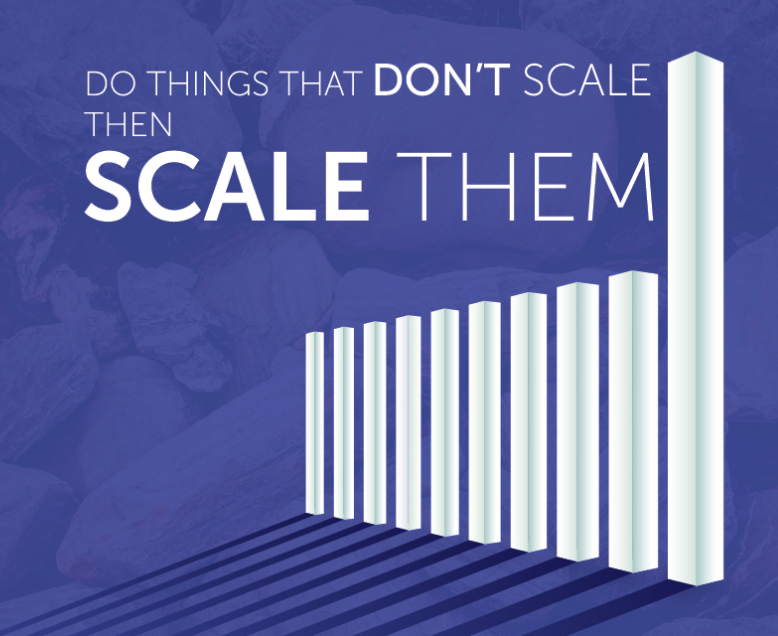When people first start a business, they are often focused on doing things that scale. However, there’s been a lot of talk recently about doing things that don’t scale.
Specifically, doing things that require a lot of human interaction and touch-points, but wouldn’t generally be defined as “scalable.” In a startup, it’s those tasks that can make or break you. We did this in the development stages of mHelpDesk and are still doing it today. I’m going to dive into the benefits of this, some examples of why it works, and exactly how we utilized things that don’t scale in business and our personal lives.
First, I’m going to talk about how this is applicable to business. Many people have this theory that “if we build it, they will come,” which couldn’t be further from the truth. Paul Graham said “The most common unscalable thing founders have to do at the start is to recruit users manually. Nearly all startups have to. You can’t wait for users to come to you. You have to go out and get them.”
In his blog post, Paul talks about the specific non-scalable things that the founders of Airbnb did that basically made their business take off. They literally went door-to-door in NYC and recruited new customers and hired a professional photographer to make the pictures on their site beautiful. I thought that was interesting because a lot of people are building incredible web companies but it seems that there’s this mindset that you can sit behind a computer, write some code, and get millions of users without ever having to interact with customers.
Once we hit that point where we needed to acquire customers, we took Paul’s advice. We used his approach by doing whatever we could to win a customer.
So, what exactly did we do that doesn’t scale?
TONS of data entry. I’m talking about thousands of line items per customer. Some of which were handwritten notes. We realized that customers wouldn’t try us out unless they had their historical data in our system – so we got it in there.
That is the definition of something that doesn’t scale. For us, it meant having to manually enter in data. There is no tool or software out there that could do that. This was a super tedious task but when a customer asked me if I could do something, my answer was always “ABSOLUTELY.”
Doing something that our competitors wouldn’t do definitely gave us the boost we needed. I believe it’s imperative for a startup to do things that don’t scale.
I also believe in taking it a step further — building a system around things that don’t scale.
At that point, we had identified a differentiator. However, it was still a task that ate up a ton of time.
How do you build a system around things that don’t scale?
Find the secret sauce
Our secret sauce was a man named Manikandaswaamy Krishnamoorthy.
I’m serious, Google him. I met him a long time ago when I use to work at Yext in NYC. I originally found him on Elance and have been working with him directly for over 5 years. I have a great relationship with this guy, and he’s actually developed a great data entry business in India. He’s even managed to become facebook friends with a lot of my friends – not sure how I feel about this but that’s another story.
At the startup stage, this is one of the things that allowed us to snowball into something bigger. Our customers were super impressed that we would do these unthinkable tasks for them and most importantly, they were highly engaged once they started using our software with all of their data inside. In addition, the lifetime value of these customers is extremely high.
This developed a strategy that still lives in mHelpDesk today. Not only should you do the things that don’t scale, but once you figure it out, you should build a system to handle that task. That way, you are able to spend your time on high-value tasks, while someone else is doing the heavy lifting (that can be repeatable) – like data entry.
This strategy doesn’t only apply to business. I’m going to give you two examples that produce two different outcomes. What some people consider as valuable, might not be the case for others. For myself, I need more time so I can work more effectively. For my friend, he needs to spend more time with him his family.
Here is my first example: A close friend of mine was recently telling me about how he and his wife didn’t get to spend enough time with their kids. He said that even when they’re home they are always cleaning, doing laundry, or doing the dishes. They had to focus their attention on these chores instead of being able to fully pay attention to their kids.
It got me thinking about people’s approach to life. Why haven’t they thought critically about this and figured out a way to spend less time doing low impact tasks (dishes, laundry, cleaning) and more time doing high-value things like paying attention to their kids?
Let’s use this example:

In this Monday-Friday scenario, you only have 5 waking hours at home per day. If you spend 1 hour per day doing low-value tasks, that is 20% of your waking hours at home during the week.
I’ll present a solution. Let’s put a high number on it and say you can get someone to do those tasks for $100 per week. Would you spend $100 per week to gain 20% more time with your kids?
Some things to consider:
What’s the upside of giving your kids your full attention? Does the stress of not having to worry about low-value tasks have a positive effect on your overall mental state and productivity? Does it make you more positive when interacting with your kids? Do kids who get more attention from their parents grow up to be more successful?
I don’t know these answers but they seem like they’re worth considering, especially if you’re trying to place a value on the time spent with your kids and the level of attention that’s being allocated to them.
When I say low-value tasks, I’m specifically referring to things that other people can do so that you can free up your time to do other things like work or spend time with family. Time is our most valuable resource and thinking about time allocation is a really important exercise. In this example, you are exchanging $100 to gain 20% more time with your family.
Now, let’s look at this from a business owner’s perspective. Imagine outsourcing mundane tasks like data entry, office cleaning, invoicing, etc. Using the family example, 5 hours per week for a business owner has a high dollar value attached to it. One example would be a business owner, say a plumber, that bills out at $125 per hour. Being able to gain 5 additional hours per week is a huge number. This would totally make paying $100 per week for simple services (cleaning, data entry, etc) well worth it so they can refocus their time on billable hours.
Tim Ferris speaks a lot about this in his book the 4-hour workweek. He outsources a ton of things. Personally, I hate cleaning, doing dishes and doing laundry. I’m also pretty bad at it because while I’m doing those tasks, I start thinking about other things and then usually get distracted and mess things up. So, I implemented a solution to “scale” this. I currently spend $60/week for someone to take care of these things for me (a very sweet lady). This gives me an additional 6 hours per week to spend on other things that I’m better at. Not that I’m spying on her, but I even have a dropcam so that I can keep an eye on my apartment from work. I get alerts when there’s movement which is typically only when Concha is there cleaning. Hey Concha!
I’m a firm believer in building systems around things that don’t scale. I am currently testing out a virtual assistant service called Fancy Hands as well. They do tasks like finding flights, online research, calling cable or phone companies to fix account issues, and many other cool things. This allows me to stay focused on high-value tasks. I highly encourage you to try this concept and see how far you can stretch it. You’ll be amazed at how much time you’ll be able to free up by letting someone else do the heavy lifting on things that don’t require “you” to do them.
I can’t promise that doing things that don’t scale is your meal-ticket for your personal life or your business. However, I can promise you that it’s something almost every successful person has run into. Not only should you focus on things that don’t scale, but take it a step further, and find a resource to streamline the process.
Scale by building systems around the things that don’t scale.
Last Updated By: Rochelle Sanchirico
Field Service Automation
Service Solutions
Last modified: January 16, 2018







